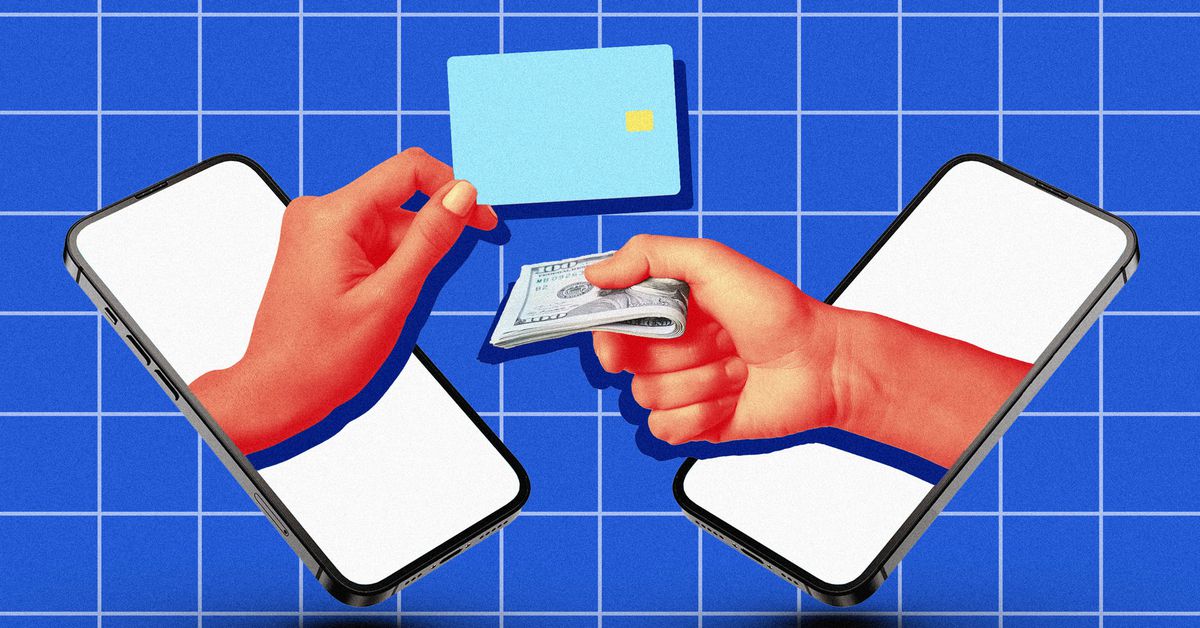“If you’re someone who’s buying products on the web, we know who is buying the products where, and we can leverage the data,” Grether said in a statement to the WSJ. He also said that PayPal will receive shopping data from customers using its credit card in stores.
A PayPal spokesperson tells the WSJ that the company will collect data from customers by default while also offering the ability to opt out.
PayPal is far from the only company to sell ads based on transaction information. In January, a study from Consumer Reports revealed that Facebook gets information about users from thousands of different companies, including retailers like Walmart and Amazon. JPMorgan Chase also announced that it’s creating an ad network based on customer spending data, while Visa is making similar moves. Of course, this doesn’t include the tracking shopping apps do to log your offline purchases, too.
It should be completely illegal for these companies to just completely fucking change the nature of our agreements decades later. This is bullshit.
It is illegal in Europe, but not widely enforced.
It wouldn’t have to be illegal if we transitioned to a decentralized and anonymous payments system that doesn’t involve the likes of PayPal
Yeah that would work if you weren’t forced through a billion KYC hoops just to buy some BTC or XMR.
It’s annoying but you have to do that kind of stuff to open a bank account or get a new credit card too
Yes but that has been the case for eons. I’m more inclined to be okay with those, just not with some random company that claims to need my sensitive, unchanging information to “allow” me to spend my money. Goes for crypto exchanges as well. I want to jump into Bitcoin for example, but the only way is to use a DEX (already tried, won’t work for me) or to give an exchange this information.
The financial system is screwed. There’s no way to escape the slavery.
The reason they need it is because of the law making it illegal for them not to collect it, though that doesn’t make it any less of a barrier that they have no choice. I would say at this point Coinbase and Kraken are at least as reputable as something like PayPal/Venmo (which I think you can actually also buy crypto from); iirc Coinbase is a publicly traded corporation, has various licenses with governments to operate, is handling custody for major financial institutions now that some crypto ETFs have been approved, it’s not like the early days of crypto where even the biggest exchanges had little real claim to legitimacy.
As for difficulty of using DEX for non KYC trades, I have heard a lot of anecdotes about that confirming your experience that it does not work well. However I would keep an eye on it, there’s significant recent changes with the shutdown of LocalMonero, the launch of Haveno, progress in the development of atomic swaps. I expect that it’s going to improve significantly in usability for the average person, so long as there aren’t major efforts by governments to criminalize it.
I don’t buy that Privacy.com needs it. I use PayPal regularly and never once have I had to give them anything except my name and the credit card info.
That said, I don’t know about Kraken but isn’t Coinbase custodial? I will not use custodial exchanges. In terms of DEXes, I hope they improve because that will be the only feasible solution for me. I tried Bisq, nobody was selling for any less than hundreds of dollars in fiat and I’m kinda nervous about sending cash in the mail even if they have an escrow (as AgoraDesk/LocalMonero did).
If you are comfortable with PayPal you can buy crypto from them afaik, though I am fairly sure you will have to provide additional KYC info than name and credit card, most of the cryptocurrency community obviously hates KYC and there would absolutely be centralized non-KYC options for buying crypto if it wasn’t blatantly illegal to offer that.
isn’t Coinbase custodial? I will not use custodial exchanges
That’s totally fair but consider that if your intention is to purchase crypto and immediately withdraw it to a personal wallet, there are zero practical drawbacks to an exchange being custodial because they are only holding your crypto in custody for the brief period of time between when you click the buy button and when you click the withdraw button. A DEX with escrow is going to be less custodial than that, but I would call it still a little bit custodial, since even if the escrow person doesn’t have the option to take your crypto for themselves they could still potentially collude with the seller and send it back to them, which means there is a brief window when the crypto you have purchased is not truly under your personal control. You can have a crypto to crypto dex be perfectly non-custodial (ie. Uniswap), but you can’t have a fiat to crypto exchange be perfectly non-custodial.
So… Cash? Cryptocurrency pegged to the dollar?
Cash works, but not for online purchases. I pay for a VPN subscription anonymously with a cryptocurrency wallet app, it’s at least as convenient as using PayPal, and unlike PayPal I can be sure there isn’t a middleman collecting/selling my transaction data for ads or whatever else. This is a solution that works and exists right now. I know a lot of people really don’t like cryptocurrency, but I’d also be ok with some other system that satisfies the same requirements.
To solve the problem instead by regulating payment providers, to begin with you would have to convince governments that are largely in the pockets of these companies to act against them. You would have to get these people to craft a set of laws telling them, “hey, this information you’ve collected that is on the computers you own and control, don’t look at it ok? Also don’t do anything with it unless we say it’s ok.” and then, somehow, actually enforce that. It’s taking a system basically made to centrally collect and control information, and hoping that people with an obvious interest in using it for that purpose will play along with retrofitting it to prevent privacy violations. To me this seems like planning for failure when you can instead just use a system that doesn’t involve trusting a company with this info to begin with.
I mean, the blockchain is public, so all that data is definitely being mined. It’s really just a matter of whether your transaction history can be correlated to you (e.g. bought the crypto through an exchange via credit/debit, or if you’re making crypto purchases in a way that correlates strongly enough with your internet traffic).
No, I used Monero, transactions aren’t visible. You are right that blockchains are public and there is a lot of mineable data in cryptocurrency generally, but the point is that it is possible to have a system of digital payments with all the privacy properties of physical cash.
Fair, I know about Monero, I just forgot it existed for a sec lol
Wasn’t the EU working on some digital Euro? I know it wouldn’t help Americans at first but maybe create enough pressure for others to follow.
Been keeping my eye on these guys hoping they can turn the tide: Taler
I kind of wouldn’t want a government spying on me with this either, but it would be somewhat of an improvement over both the government and companies spying on me with it.
GNU Taler could replace Paypal, we can only hope.
In the beginning PayPal was needed due to credit cards not working for international payments. Now not so much. They are giving you a reason to leave.
I’m so over this. So exasperated by it. Every company in a scramble to the bottom. Meanwhile my country’s reporting a downturn in FOOD spending because people are fucking poor.
We’re being bombarded with ads at every turn, having our data sold off, stolen, or repurposed for LLMs… Meanwhile the customer experience gets worse and worse.
I work in digital ux and honestly, I just want to unplug and go live in a cave.
Been interested in computers since childhood, and have been working in the IT industry for over a decade now.
I would love to take a sledgehammer to all of my stupid customer’s servers and go live on a farm. The future we made for ourselves is fucking retarded.
We? No. I didn’t participate in the building of this future.
The sad thing is that even if you really wanted to go off the grid, live in a cave, and rediscover the fire, you wouldn’t be allowed to.
Microcenter shares purchases with Facebook. Even when you shop at the store.
What if you pay cash?
Facebook doesn’t care
Cool how do they track you then. Pretty certain it’s CC related.
Maybe if you have a microcenter account. I wouldn’t be surprised if the fucks are using face recognition, though.
True
Pretty sure my local bank has been doing this for a few years now. I thought I was losing it, but apparently it’s a thing.
Only thing that pisses me off (besides the obvious fact that its my bank doing this, and i dont want ads) is that I get ads for the same stuff I just bought. If your supposed to be some all knowing awesome algorithm that understands me better than I understand myself, send me ads for stuff I might actually want, but haven’t bought yet. Not, literally, the same thing I bought two days ago, and have no need for, for at least another month. Idiots.
you’re* supposed.
Also, adblockers.
I assume most things advertised in apps and websites to be low quality or scammy. I hate advertising enough that I actually avoid any large company that throws ads in my face because I assume they can no longer rely on their reputations and arr no longer the value they were when they rose to prominence.
PayPal’s hegemony must end.
Hegemony? eBay and Play Store are the only places I’ve seen PayPal for the last decade
Paypal is everywhere. Many sites accept it, even government ones.
Luckily, they’re not the only ones in the game.
As of 2022, PayPal operates in 202 markets and has 426 million active, registered accounts.+700 000 corporates accept PayPal payment, top 1000 : 72%. 1.5 billions in transactions. They own iZettle, Honey, Braintree, venmo, curv, paidy, gopay, … I think hegemony was the right word.
This is the best summary I could come up with:
The company’s new advertising business will encompass purchase information and customer spending habits from PayPal and its sister app Venmo, according to The Wall Street Journal.
A PayPal spokesperson tells the WSJ that the company will collect data from customers by default while also offering the ability to opt out.
When asked about the kinds of data PayPal will collect, spokesperson Taylor Watson told The Verge that the advertising platform is still in “early stages” and that the company doesn’t have “definitive answers” yet.
“Alongside the advertising business, PayPal will build transparent, easy-to-use privacy controls,” Watson says.
In January, a study from Consumer Reports revealed that Facebook gets information about users from thousands of different companies, including retailers like Walmart and Amazon.
JPMorgan Chase also announced that it’s creating an ad network based on customer spending data, while Visa is making similar moves.
The original article contains 325 words, the summary contains 143 words. Saved 56%. I’m a bot and I’m open source!
Alternatives? Except for not using services that require PayPal.
In America they have VenMo and CashApp, in Europe, it feels like PayPal have a monopoly.
Pretty sure Venmo is owned by PayPal.
correct; acquired in 2013.
Ha! They really need competition.
Paypal was the fast way to transfer money until 2024 in the EU.
But the EU has recently made it mandatory for banks to offer free SEPA instant payments. 15 seconds to send up to 100k as far as I know.
BTW: Look at the share price and how it went down and did not recover…
I’d never heard of SEPA. That’s actually quite cool. Does that mean no more seeing payments pop up six days later.
SEPA is actually what we had so far. That is how the employer sends you the money. That’s how you pay rent. That’s how you pay off debts. That’s how your insurances take money from you.
SEPA instant payments is what’s new and it allows to transfer money to someone in under 15 seconds. It existed for a few years, but usually cost money and was not even available for all banks. That’s changing now. Step 1 is making it free and force all banks to offer it. Step 2 will be replacing the old, slower system with it completely.
Thank you so much for taking the time to explain. It’s posts like this why I enjoy Lemmy so much. Thanks for educating me.
Same happened in Australia. A few years back they brought in osko payid. Which means you can send money from your bank directly to others via their email or phone number. And it arrives in seconds.
Also free.
As much as I’d like PayPal to have competition, I’ve seen the share chart and there’s a flexion just this month (not a so small one, but it’s just a month).
What the EU has done with instant bank transfer is great, but I think that the 15 seconds limit is too much for that function to be used by other apps (Satispay) to transfer money. I mean, 15 seconds is nothing, but waiting in line at the supermarket standing still for 15 seconds will fill an eternity!
The 15 seconds are more like a maximum. It’s usually faster. Taking out you phone and maybe entering the phone PIN, opening the banking app and entering a PIN for that takes some time, too.
The advantage that Paypal still has: It’s like a social network. People are connected and it might be easier to use it instead of first asking people for their IBAN code to send the money…
If it’s less than that, it could work. The problem about asking the IBAN could be bypassed by QR codes in shops. I think that the instant bank transfer (if very fast) could help the rise of other apps that don’t have to pay fees to the credit card circuit and so be competitive and compete with PayPal.
What about privacy-respecting alternatives?
The closest you will get is a prepaid credit card. The reason why PayPal are so big is because they’re universally accepted.
Is it just me or are cheques still the best, cheapest, most secure, and generally universal way to send money from one person to another?
I’ve been thinking about this a lot the past few weeks.
- Assuming all parties have a bank account, you normally can get checks for free or some nominal amount.
- Checks can be deposited via a bank’s mobile app.
- They don’t require you to download a separate app.
- You can stop a check by calling your bank
- Since your money doesn’t leave the bank, it’s FDIC insured
Yes I know that the MIRC line isn’t secured but your account is still protected by the bank for any fraud. You don’t get those same protections from venmo or cashapp.
The closest I’ve seen is zelle but not every bank supports it.
Every bank supports depositing in a check.
Is it just me
Yep, it’s just you. The number one thing is the instant transaction.
Cheques? Who uses those anymore? I see them useful maybe for a down payment for a house. I don’t think that there is a merchant today that would accept them.
most secure
Yeah because it’s really secure anyone can take out your cash via ACH or whatever by your account numbers on that piece of paper.
your account is still protected by the bank for any fraud
Your bank is required to investigate and such, yeah? And you will most likely get your money back - after a while - if their investigation determines it was fraudulent. But a long process that’d be avoided by having a safer electronic transfer system. And what will you do if the bank thinks it’s some friendly fraud?
Not worth it. I don’t even like direct debit. No one should initiate taking money from my account other than myself.
Just using a debit/credit card? I still choose not to do this when there’s a PayPal option though, just feels riskier!
You know when you use your credit card and it shows the last 4 digits on the receipt big data collects all that and knows exactly who you are and where you shop and is used for targeted ads and demographic research. If you ever used your credit card where they know your name/ delivery address and even if you didn’t they know exactly who you are. This technology is old as dirt not even sure why PayPal announced this like it’s a big deal.
That sounds pretty illegal under the GDPR though, hence why I usually feel fine paying by card if the website feels like they obey the law.
I don’t mean online where gdpr applies I mean in physical stores. My company uses a service called bridg but there’s others. If you swipe your card to buy something at my business and I don’t know anything about you except that card swipe. I can find out who you are, where you live, your approximate income etc. Then cross reference that with any other database that can be bought or other bridg partners to know your spending habits. Then I can say find me more customers matching op profile for my business and that’s how you get targeted in the real world. Online it’s 100x easier for them because you are typically getting something mailed.
GDPR isn’t just an online thing, it applies everywhere so I don’t know how your bridg software is getting away with that!
I really miss the fake credit card number paypal used to have for sites that didn’t take paypal
As far as data goes, purchase data is one I can live with businesses doing this kinda stuff with. I’m using their platform to complete the sale, so it’d make sense to me they’d have data of that sale. And it makes sense to me that a business would leverage that data in ways to benefit themselves.
Someone tell me if I should be concerned, but this seems like what everyone else has done as long as they’ve been able to do it.
And it makes sense to me that a business would leverage that data in ways to benefit themselves.
Big fat nope on that one. This is exactly what the GDPR is about. I’m giving you my data for a specific purpose, and unless I tell you otherwise, you have no fucking business using that data for anything else. Gonna be interesting to see how this one plays out in the EU.
Thw issue is aggregation of all of the data into mega datasets that are used to fix prices.
A lot of the inflation we are seeing recently is literally result of these dataset being compiled.
They know how much you make, how much you save etc so they can determine how much they can extract from you esp once you add behavioral data. We are all profiled and they know what you like.
Although fast food seems to finally hit a wall on that…
The worst part is that it doesn’t just affect you, it’ll make it much easier to profile new users going forward so future generations will be screwed over even more. Imagine your insurance prices or phone bill being calculated by your max tolerance you would pay before searching for a different provider
we started down this path when we all signed for cash back credit card tbh…
but yes data does have a snow ball property… and boy have we hit critical mass. at this point, i doubt any of this can be reverted or even properly countered.
Best we can do is small direct action since the government sold out us and will side with mega corps.
I’m kinda surprised to hear they didn’t already do that… I guess I just assumed that was the entire point of them acquiring “honey” and had been doing it since at least that point.
I really wish there were another option. The only other option is to give raw credit card data to vendors, which is horrible for security given all the data breaches that happen. And no, card masking services like Privacy.com aren’t an option when they’re requiring your SSN (which is a load of BS).
Opt out to payment data sharing is pretty illegal in EU.
Will? That’s an evil company, surely slightly evil targeted ads have been going on for awhile.
More power to em. I stopped using them years ago.














